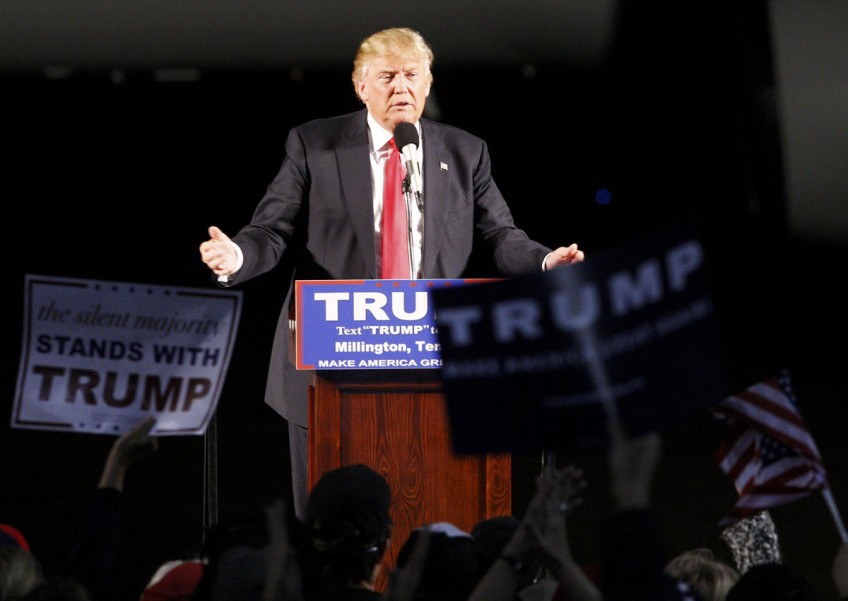All eyes on Trump on Super Tuesday

Billionaire Donald Trump heads into the biggest day of the primary season tomorrow under heavy fire as the Republican Party establishment makes a last-ditch effort to halt his insurgent campaign.
A total of 13 states and one American territory will hold election caucuses and primaries on so-called Super Tuesday. And though it holds significance for both parties, most of the attention will be focused on how the Republican race develops.
Many observers see the day as potentially the last chance for the anti-Trump crowd to prevail over the front runner.
"March 1 - indeed with over 600 delegates - has the potential to put such a gap between him and everyone else in the field," said Republican Party insider Ben Ginsberg, a lawyer who served as national counsel to the George W. Bush campaign in 2000 and 2004.
"He will be going to his strengths, which are massive amounts of earned media and the money resources he has to buy more advertising to knock everybody else out. His claim on March 2 will be, I won more states than anybody else; I am the winner."
Mr Trump has won three of the four contests so far and is leading in polls of all but one state voting tomorrow. He has also been able to sway some previously resistant establishment Republicans to his side.
The endorsement from party stalwart Chris Christie, the New Jersey governor, last Friday sent shockwaves through the party and many worry that more could follow.

Mr Trump also holds a significant advantage entering the contest because of his strong name recognition and large war chest.
Said Georgia State University Associated Professor of Political Science Dan Franklin: "Up till now, candidates have been able to do retail politics but as of Super Tuesday, they are going to do wholesale politics, and wholesale politics costs a whole lot of money because you have to buy air time."
Still, Mr Trump has not faced such a concentrated attack from his rivals until now.
After months of largely avoiding confrontation with the front runner, Senator Marco Rubio, the current establishment favourite, has gone all out against Mr Trump since a combative debate on Thursday.
Over the weekend, he sought continuously to paint his rival as a con man, accusing the tycoon of shady business dealings and hiring practices. Many large Republican establishment lobby groups have also been pouring money into attack ads making the same points.
"I will do whatever it takes, I will campaign as long as it takes, I will stay in this race as long as it takes. Donald Trump, a con artist, will never get control of this party," Mr Rubio declared at a Georgia rally on Saturday. "Friends do not let friends vote for a con artist."
Still, Mr Rubio will face tough questions if he performs poorly tomorrow. His own acid test will come on March 15, when his home state of Florida casts its vote. Pundits agree the Rubio campaign will struggle to carry on if he loses in his own state.
That logic is one of the reasons Texas will be among the most closely-watched contests on Super Tuesday. The state is the largest one up for grabs and also the home state of Mr Trump's only other viable challenger - Senator Ted Cruz.
On the Democratic Party side, the contest is far less dramatic, even if there remains some remote possibility of upsets.
After her emphatic win in South Carolina on Saturday, former secretary of state Hillary Clinton looks nicely poised to pick up wins across nearly every state.
Senator Bernie Sanders, on the other hand, will need to focus on states with mostly white populations, like Minnesota and Massachusetts, to try to eke out some wins to keep his campaign going. If he has another bad night, the Democratic race could be sewn up before the end of March.
As Brookings Institution senior fellow Elaine Kamarck put it: "The race really begins in earnest (on Tuesday)... We're on the precipice of really finding out where this race is going."
What you need to know about Super Tuesday
Q WHY IS SUPER TUESDAY SO IMPORTANT?
A Though the primary season goes on for months, no single day will see as many contests as March 1, so-called Super Tuesday. More so than any other day, Super Tuesday gives candidates a chance to make a broad case about their nationwide appeal. Up to this point, contests have been taking place one at a time.
Q WHICH STATES ARE VOTING?
A Voting will take place in 13 states and the US territory of American Samoa, though not every state is choosing nominees for both parties. Only Alabama, Arkansas, Georgia, Massachusetts, Minnesota, Oklahoma, Tennessee, Texas, Vermont and Virginia will hold elections for both Democrats and Republicans.
Alaska will have only a Republican caucus while American Samoa will have only a Democratic one. Unlike the Democratic caucus in Colorado, which will pick a nominee, the Republican caucuses in Colorado and Wyoming will not.
Q HOW MANY DELEGATES ARE AT STAKE?
A About one quarter of delegates are up for grabs for Republicans and slightly fewer for Democrats. Republicans will allocate 661 delegates while Democrats will allocate 865. To win the nomination, Democratic candidates need at least 2,383 delegates while Republicans need at least 1,237.
Q WHICH ARE THE RACES TO WATCH OUT FOR?
A Texas is the biggest prize for Republican candidates. It is the largest state voting on that day and has 155 delegates at stake.
It is also Senator Ted Cruz's home state and a loss for him there could spell trouble for his campaign.On the Democratic side, the broader result will be an indicator of whether Senator Bernie Sanders can make an improbable comeback.
jeremyau@sph.com.sg

This article was first published on February 29, 2016.
Get a copy of The Straits Times or go to straitstimes.com for more stories.